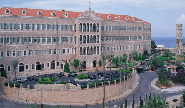Farming has always been a challenge in Lebanon—especially in the country’s south. Long overlooked by authorities, the agricultural sector has struggled to stay afloat. Over the past two years, the burden has only grown heavier. Regional instability, economic hardship, and institutional neglect are pushing the land—and those who tend it—to the brink.
By the summer of 2025, as watermelons and peaches ripen under the sun, farmers face a grim reality. Once a key supplier of Lebanon’s summer fruits, the South now grapples with security threats, economic challenges, and state abandonment.
Farming Under Watch, Living in Fear
In a normal year, the watermelon fields of Marjayoun and the peach orchards of Wazzani would buzz with harvest activity. But this season, nearly half of the Marjayoun plain—some 17 million square meters—remains off-limits. Farmers avoid vast stretches of land out of fear of Israeli patrols and forward positions perched atop al-Hamames hill, which looms over the area.
The Israeli military presence is part of a broader strategy to establish a buffer zone along both sides of the Blue Line. For those on the ground, the impact is constant: surveillance drones overhead, bulldozers encroaching on farmland, and the distant echo of artillery fire.
“We see their posts, their cameras. The drones never stop buzzing above our heads,” says Abou Walid, his calloused hands bearing witness to a lifetime in the fields. “We’re under constant watch. We pray nothing happens while we work.”
Farmers have become their own early-warning system. “We alert each other to suspicious movements near the border,” he explains. “We share updates through apps designed for emergencies.”
Michel, whose peach grove lies just a few hundred meters from Israeli forces, adds, “We don’t go near some areas anymore, even when the soil is rich. It’s too dangerous. We’ve seen fields targeted. The fear is always there—it’s become part of life.”
A Constant Struggle
Labor shortages have become a pressing challenge. Those willing to work demand higher wages to offset the risks. “No one wants to risk their life for a few kilos of fruit. And those who do, ask for wages I can barely afford,” says Jihad, owner of a large watermelon field in Wazzani.
Access to the fields is another ordeal. Bombed-out roads, raids, and dangerous terrain make transporting crops costly and difficult. “Sometimes we have to take long detours to avoid risky areas,” explains Jihad. “That wastes fuel and time, and every minute on the road adds to the stress.”
Farmers also struggle to access water sources and pumping stations dangerously located near Israeli military posts.
The quality of the fruit is also suffering. “Our watermelons are smaller this year, and some have cracked from the heat. Regular watering is essential—without it, everything is lost,” says Majed, a farmer in Wazzani.
Exports in Peril
Another heavy blow: exports. Once destined for markets in Lebanon, Syria, and occasionally Jordan, these crops face mounting logistical hurdles. “I have 12 tons of watermelons ready to ship. I found a buyer in Saida, but no one wants to transport my load,” says Fawzi, a producer from Wata Khiam. “Even the truckers are afraid to come near the South.”
For southern Lebanon—especially the border areas—exports are a lifeline. But the region’s reputation as a “conflict zone” scares off buyers. This is compounded by the destruction of many orchards, burned by phosphorus bombs and Israeli airstrikes.
An Absent Ministry
Southern Lebanon produces nearly 40% of Lebanon’s citrus and summer fruits—now all at risk. Economic losses are estimated at $2.5 billion.
Calls for agricultural reform, humanitarian aid, environmental support, and sustainable development have never been more urgent. Yet, while public promises multiply, the reality is bleak.
“The ministers brag in front of cameras, but we’ve received no aid, no compensation, and no insurance. We’re left to fend for ourselves,” says Ibrahim.
NGOs play a vital role but are overwhelmed by the scale of the need and security constraints.
Amel International has launched a program distributing seeds and grains to families whose lands were heavily impacted by the conflict between Hezbollah and Israel. They also provide technical support to ensure sustainable crop yields.
For Nahida from Amel, “Agriculture is not just about survival; it’s a deep connection to the land, a sense of identity and dignity. Reviving the fields of southern Lebanon is an act of civil resistance and a beacon of hope.”



Comments